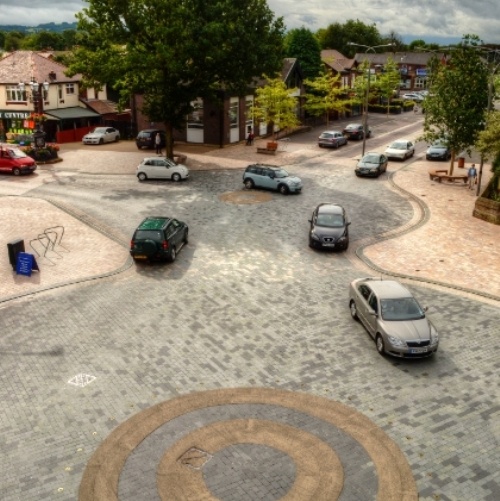 “Imagine a city with no sidewalks. Not because the cars have disappeared, or because the pedestrians have been banished to bridges and tunnels, but because all kinds of traffic are sharing the public spaces. The conventional division of the space of our streets no longer valid. – We understand human behavior much better now than we used to, says Ben Hamilton-Baillie. He is an architect at a a small company providing specialist knowledge and experience of innovative solutions for reconciling traffic movement with quality public spaces in cities, towns and villages.” (From an interview with Ben Hamilton-Bailiie by Ola Bettum and Eimar Lillebye)
“Imagine a city with no sidewalks. Not because the cars have disappeared, or because the pedestrians have been banished to bridges and tunnels, but because all kinds of traffic are sharing the public spaces. The conventional division of the space of our streets no longer valid. – We understand human behavior much better now than we used to, says Ben Hamilton-Baillie. He is an architect at a a small company providing specialist knowledge and experience of innovative solutions for reconciling traffic movement with quality public spaces in cities, towns and villages.” (From an interview with Ben Hamilton-Bailiie by Ola Bettum and Eimar Lillebye)
During the February gathering we deepened our understanding of the dynamics of habits, investigating why unlearning can sometimes be challenging and what we can do to foster it. The March Chair Call will be a bridge between our exploration of how to change individual mindsets and habits to unlearning at a systems level. As a way to spark our thinking about what drives systemic change, we have invited architect Ben Hamilton-Baillie to join and share the ideas behind Shared Space, an urban design approach which seeks to minimize demarcations between vehicle traffic and pedestrians, often by removing features such as curbs, road markings, traffic signs and some regulations. This approach goes contrary to how many towns, states and countries have chosen to shape driver’s behavior – that is through legislation. To the surprise of many skeptics, this Shared Space approach works.
In our own organizations, we often try to improve performance by clearly defining work processes and procedures expecting that these will produce the expected outcomes. Yet in many cases they don’t. By exploring the Shared Space approach, we hope to gain some insights into such questions as:
- How might we identify what needs to be unlearned before trying a systemic change?
- What systemic mindsets and habits have to be unlearned before change can be initiated?
- Does unlearning have to occur simultaneously throughout the whole system or can it be a gradual and in pockets?
- How do you design systemic cues into the environment in order to prompt different actions and sustain the new behaviors ?
If you are interested in finding out more about the Shared Space approach prior to the Chair Call, you can watch the short video about the village of Poynton in the U.K. which has undertaken one of the most ambitious experiments to date in this type of street design. It was a controversial project from the start with many predicting that the approach of removing street signs in the center of a town where 26,000 vehicles a day passed through would never work. To watch the video go to: http://www.youtube.com/watch?v=-vzDDMzq7d0
